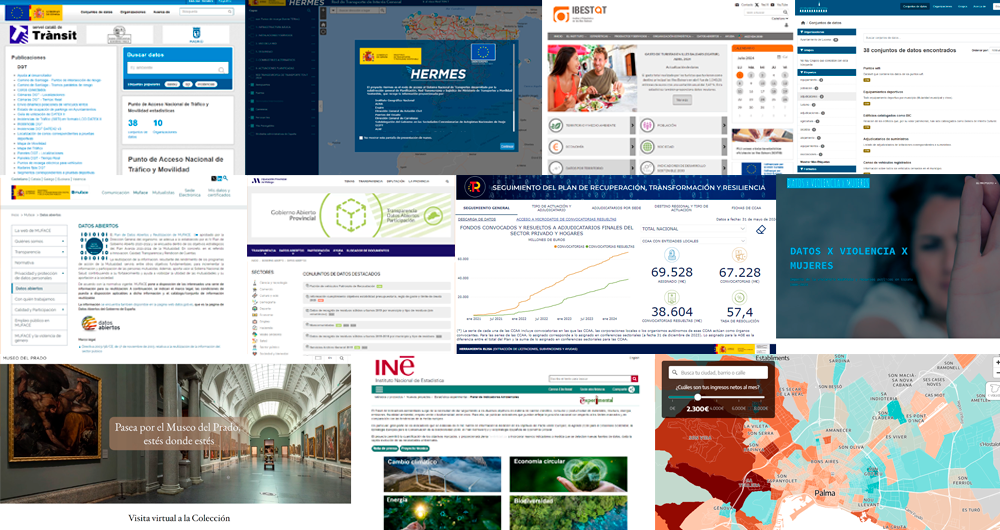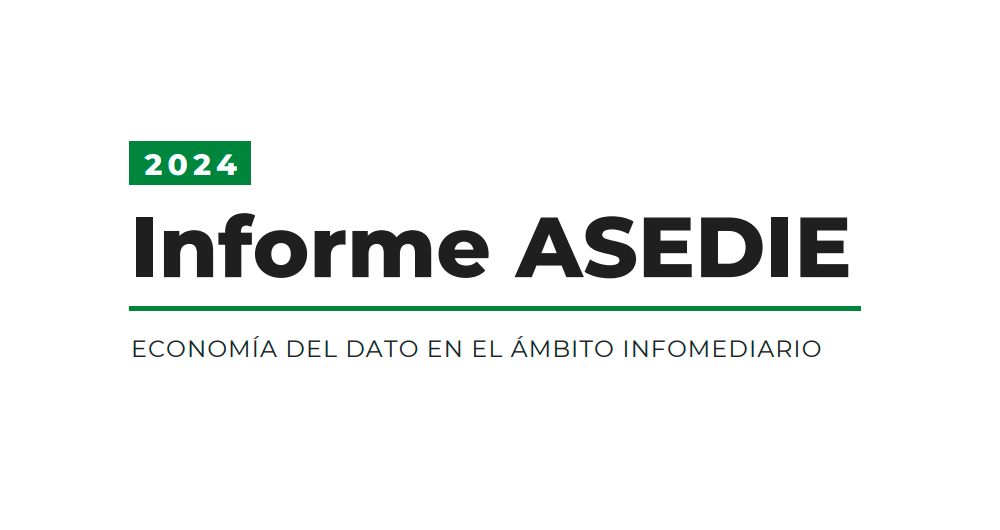
It seems like only yesterday that we were finishing eating our grapes and welcoming the new year. However, six months have already passed, during which we have witnessed many new developments in the world, in Spain and also in the open data ecosystem.
Join us as we take a look back at some of the most newsworthy open data events that have taken place in our country so far this year.
New regulations to boost open data and its use
During the first weeks of 2024, some legislative advances were made in Europe, applicable in our country. On 11 January, the Data Act came into force, which aims to democratise access to data, stimulate innovation and ensure fair use across Europe's digital landscape. You can learn more about it in this infographic that reviews the most important aspects.
On the other hand, at the national level, we have seen how open data is gaining prominence and its promotion is increasingly taken into account in sectoral regulations. This is the case of the Sustainable Mobility Bill, which, among other issues, includes the promotion of open data for administrations, infrastructure managers and public and private operators.
This is a trend that we had already seen in the last days of 2023 with the validation of Royal Decree-Law 6/2023, of 19 December, approving urgent measures for the implementation of the Recovery, Transformation and Resilience Plan for the public service of justice, the civil service, local government and patronage. This Royal Decree-Law includes the general principle of data orientation and emphasises the publication of automatically actionable data in open data portals accessible to citizens. The government's Artificial Intelligence Strategy 2024 also includes references to data held by public bodies. Specifically, it establishes that a common governance model will be created for the data and documentary corpus of the General State Administration in such a way as to guarantee the standards of security, quality, interoperability and reuse of all the data available for the training of models.
In relation to governance, we saw another development at the end of 2023 that has been reflected in 2024: the adoption of the Standard Ordinance on Data Governance in the Local Entity, approved by the Spanish Federation of Municipalities and Provinces (FEMP in its Spanish acronym). Over the last few months, various local councils have incorporated and adapted this ordinance to their territory. This is the case of Zaragoza or Fuenlabrada.
News on data platforms
In this time, new platforms or tools have also materialised that make data available to citizens and businesses:
- The Government of Spain has created the National Access Point for Traffic and Mobility which includes data on the facilities with electric vehicle charging points, detailing the type of connector, format, charging mode, etc.
- The National Institute of Statistics (INE in its Spanish acronym) has launched a Panel of Environmental Indicators. With it, it will be possible to quantify compliance with environmental targets, such as the Green Deal. It has also created a specific section for high-value data.
- The Statistical Institute of the Balearic Islands (IBESTAT in its Spanish acronym) has revamped its web portal which has a specific section on open data.
- Open Data Euskadi has published a new API that facilitates the reuse of public procurement data from the Basque administration.
- MUFACE (General mutual society of civil servants of the State) has launched a space with historical and current data on choice of entity, health care, etc.
- Some of the local authorities that have launched new data portals include the Diputation of Málaga and the City Council of Lucena (Cordoba).
- The Museo del Prado has set up a virtual tour which allows you to tour the main collections in 360º. It also offers a selection of 89 works digitised in gigapixel.
- Researchers from the University of Seville have collaborated in the launch of the PEPAdb (Prehistoric Europe's Personal Adornment database), an online and accessible tool with data on elements of personal adornment in recent prehistory.
In addition, agreements have been signed to make further progress in opening up data and boosting re-use, demonstrating the commitment to open and interoperable data.
- The INE, the State Tax Administration Agency (AEAT in its Spanish acronym), the Social Security, the Bank of Spain and the State Public Employment Service (SEPE) have signed a agreement to facilitate joint access to databases for research of public interest.
- The councils of Castelldefels, El Prat de Llobregat and Esparreguera have joined the Municipal Territorial Information System (SITMUN) to share geographic information and have access to a transversal information system.
- The Universidad Rey Juan Carlos and ASEDIE, the Multisectorial Association of Information, have joined forces to create the Open Data Reuse Observatory which is born with the vision of catalysing progress and transparency in the infomediary field, highlighting the importance of the data-driven economy.
Boosting the re-use of data
Both the data published previously and those published as a result of this work allow for the development of products and services that bring valuable information to the public. Some recently created examples include:
- The government has launched a tool to track the implementation and impact of the Recovery, Transformation and Resilience Plan investments.
- Data on the network of ports, airports, railway terminals, roads and railway lines can be easily consulted with the this visualiser of the Ministry of Transport and Sustainable Mobility.
- The Barcelona Open Data Initiative has presented a new version of the portal DadesXViolènciaXDones a tool for analysing the impact of policies against male violence.
- Madrid City Council has shown how it measures the use of the Cuña Verde Park through data analysis and its GovTech programme.
- Furthermore, in the field of data journalism, we find many examples, such as this article from elDiario.es where one can visualise, neighbourhood by neighbourhood, the price of rent and access to housing according to income.
These data combined with artificial intelligence makes it possible to solve and advance social challenges, as the following examples show:
- The wildINTEL project, of the University of Huelva, in collaboration with the state agency Consejo Superior de Investigaciones Científicas (CSIC), aims to monitor wildlife in Europe. It combines citizen science and AI for effective biodiversity data collection and management.
- Experts at the International University of La Rioja have developed AymurAI, a project that promotes judicial transparency and gender equality through artificial intelligence, based on methodologies with a gender perspective and open data.
- Two researchers from Cantabria have created a model that makes it possible to predict climatic variables in real time and in high resolution by means of artificial intelligence.
On the other hand, to boost the re-use of open data, public bodies have launched competitions and initiatives that have facilitated the creation of new products and services. Examples from recent months include:
- The7th Castile and Leon open data competition.
- The University of Zaragoza's Pedro R. Muro-Medrano Awards.
- The València City Council awards for open data and data journalism projects.
New reports and resources linked to open data
Some of the reports on open data and its re-use published in the first half of the year include:
- The "ASEDIE Report: Data Economy in the infomediary field", now in its twelfth edition.
- The ASEDIE report "Geospatial data in the Ministry of Transport and Sustainable Mobility. Impact of the information co-produced by IGN and CNIG".
- The report "The reuse of open data in Spain" by the COTEC Foundation.
- The "Guide of Good Practices for Data Journalists" elaborated by the Observatori de Dades Obertes i Transparència of the Universitat Politècnica de València (UPV).
A large number of events have also been held, some of which can be viewed online and some of which have been chronicled and summarised:
- The "III National Meeting of Open Data (ENDA): Data to boost the tourism sector", organised by the Deputation of Castellón, the Deputation of Barcelona and the Government of Aragón.
- The round table "Building Tourism Intelligence: Data Sharing for Strategic Decisions in the Tourism Sector" organised by SEGITTUR (State Trading Company for the Management of Innovation and Tourism Technologies) as part of Fitur Know-how & Export.
- The session "Managing Water with Open Data" organised within the framework of the CafèAmbDades initiative of the Generalitat de Catalunya.
- The European Data Portal's workshop "How to use open data for your research", with the participation of the Universidad Politécnica de Madrid.
These are just a fe examples that illustrate the great activity that has taken place in the open data environment over the last six months. Do you know of any other examples? Leave us a comment or write to dinamizacion@datos.gob.es!


